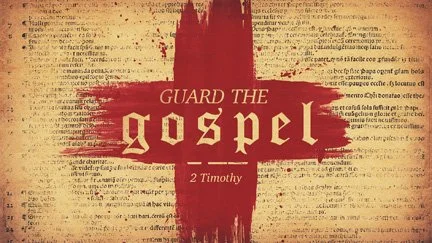Ephesians 1:11-23
The song asks the questions, “Where is the hope, where is the peace, that will make this life complete for every man, woman, boy, and girl looking for heaven in the real world.” I look around me at our country, at our world, and it’s easy to find myself asking the same questions. Where is the hope in a world that is so divided, so violent? Where is the peace when war in Ukraine continues with brutality and suffering? Where is the hope in families that cannot talk to one another because of politics? Where is the peace in a nation so anxious in these last few days before elections?
For me, for every believer, the answer to the questions is, the hope and the peace are found in God through Jesus Christ. And in these verses from the first chapter of the book of Ephesians, Paul is particularly focused on helping these Christians know the hope that was theirs because of their faith in Jesus.
Hope can be defined as “to cherish a desire with anticipation; to want something to happen or be true; to desire with expectation of obtainment or fulfillment; to expect with confidence.” Another definition of hope is “an optimistic state of mind that is based on an expectation of positive outcomes with respect to events and circumstances in one’s life or the world at large.” In terms of Christianity, hope is one of the three most important virtues listed by Paul in 1 Corinthians 13, along with faith and love. And it is clear from other writings of Paul that Christ is the source of hope for Christians.
On this All Saints Sunday, it seems appropriate to talk about hope. Because our ancestors in the faith lived with the same hope that we are called to know for ourselves. For every Christian in every time and in every place, hope has been a lifeline that has enabled believers to remain faithful no matter what their circumstances: in times of plenty and in times of need, in times of war and in times of peace, in times of persecution and in times of acceptance. Through it all, there has been hope because of what we believe to be true in Christ.
All Saints Day gives us the opportunity to remember and ponder the lives of Christians in previous generations who lived by hope and by faith in God’s promises. We will, during Holy Communion, name aloud those who have died in the past year or those loved ones who have died previously. In some ways, according to Robert E. Dunham, pastor of University Presbyterian Church in Chapel Hill, NC, this is a time of grief and the marking of painful losses; but it is also a liturgy of gratitude, comfort, and encouragement, as we draw strength from our memories and from reminders of God’s faithfulness and goodness.
Paul reminded the Christians in Ephesus that they set their hope on Christ when they became believers: they heard the word of truth, that is the gospel of salvation; they believed in Jesus; and they were marked with the seal of the Holy Spirit, which is the pledge of our inheritance among the saints. We come to Christ in the same way: we hear the gospel – maybe as a child in Sunday School, or maybe as an adult; we come to believe for ourselves that the gospel is true and that Jesus is who he said he is; and we receive the Holy Spirit as a guarantee of what is to come, our redemption and our eternal life in heaven with Christ.
These matters of faith cannot be understood in the same way that we understand matters of science or math. The eyes of our hearts must be enlightened so that we may come to know the hope to which Jesus has called us. Dunham writes, “When we see only with our eyes or hear only with our ears, we may fail to claim the hope instilled in us. To see with the heart is to imagine the future God is preparing. As Christians, we are shaped by more than our own experiences; we are shaped by our hopes, by the future into which we are living, and by the convictions by which we are living. Hope is best perceived with the eyes of the heart. Hope is best lived within the hopeful community, in the company of saints both living and departed.”
So, what is it that we hope for when we know the hope to which we are called? We will have hope for our ultimate future, in that we will claim our glorious inheritance among the saints who have already gone on to heaven. We have hope because we know where we are going. We remember that we are just travelers passing through earth on the way to heaven. Yes, life here can be wonderful and fulfilling and offer us opportunities to serve God and others. But our destiny is beyond this world. Our life is not limited to 80 or 90 years on earth; it is eternal. And God has prepared a place for us to spend eternity with him that is going to just blow our minds! Even the descriptions we find in scripture of this wonderful heavenly home are nothing compared to what the reality is going to be.
But our hope is not only for eternal life in heaven; our hope is also for life in this world. We will receive the greatness of God’s power to face all of the challenges that this life may bring our way. The power of God is so great that he was able to raise Jesus from the dead and defeat death forever. If God can defeat death, then surely God can help us handle financial stress, family quarrels, disappointing election results, fear that we could face world war, physical ailments, and anything else we can imagine. God is with us, right here, right now. God is with us and will never desert us. And we don’t face life with only our own strength and resources; we face life with the power of the Creator and Savior and Redeemer of the world. Robert Dunham writes, “We may protest that we are not up to the task, that we lack the courage and the strength necessary to live faithfully in such tumultuous times … The Ephesian letter serves as a reminder of whose power is at work in the life and witness of the church.”
We sometimes forget that the word saint does not only refer to the faithful who have died in Christ, but also to all those who believe, both living and dead. We are already saints if we follow Jesus. And Stanley Hauerwas, in his book, Unleashing the Scripture, states that saints are “people like us who have been made more than we are …” In other words, through the power and the Spirit of God, God has made us more than we think we are, more than we think we could be, so that we might live faithfully in a world that is so divided and torn and hard.
At the close of the service today, I am going to play a song of Steven Curtis Chapman, “Desperate Benediction.” It was written in January 2021. Chapman wrote about the piece, “I’m so heavy hearted at the brokenness and division that we are witnessing and experiencing in our world today, and I am processing in the way most natural to me as a singer-songwriter: with a song. Now more than ever before, it seems like the soul of our world (and our nation) is aching, longing and desperate for peace. Whoever and wherever we are, I’m convinced that at our core we are all brothers and sisters crying out for the same thing, what the Bible calls ‘shalom,’ a Hebrew word meaning peace, harmony, wholeness, completion. And ultimately, I believe that true peace, the peace that transcends all understanding and guards our hearts and minds, comes from the Prince of Peace, Jesus Christ. So it is with a heavy yet hopeful heart that I share this new song with you as a prayer, a cry, a desperate benediction for all of us, praying for peace, and praying that it starts with me, with you, with each of us.”










